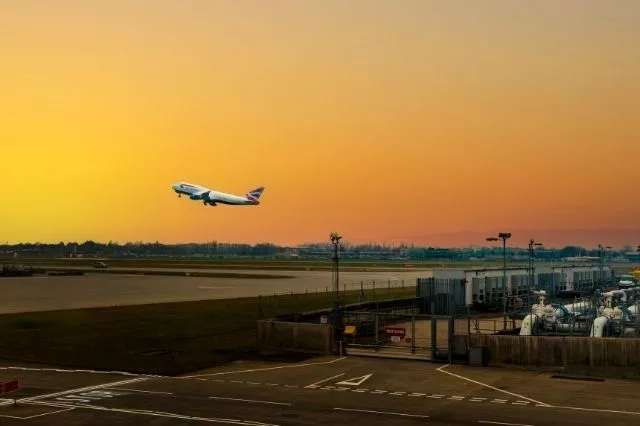IMPACT OF GREEN CHANGE AND SUSTAINABILITY ON THE ORGANISATIONAL DEVELOPMENT OF AVIATION INDUSTRY OF UK: A CASE STUDY OF BRITISH AIRWAYS
1. Introduction
1.1 Background of the study
A priority of sustainability and green change has been raised in giant industries worldwide. The aviation industry is one of them and British Airways is the second-largest company in the aviation industry in the UK (Britishairways.com, 2020). Climate change has been a serious issue nowadays and pollution from vehicles have shown a major role in this. From the aviation industry, this air pollution has been seen majorly in recent times, which need to optimize gradually.

Figure 1: Sustainability plan of British Airways
(Source: Mediacentre.britishairways.com, 2020)
British Airways has always focused on new technology and sustainable climate change worldwide from its early years (Britishairways.com, 2020). They have built various fuel-efficient engines and aircraft as well, to optimize the carbon emission from the aircraft. It is not possible to operate large aircraft without fuel and the technology to run them using clean energy has not developed yet. Thus there need to follow some strategies and ways, which will help the aviation industry to participate in bringing sustainability and green change with other industries.
1.2 Justification of the research
This research has focused on developing a strategy or plan for reducing carbon emissions from the aviation industry. British Airways is one of the largest companies in the Aviation Industry of Europe, where the pollution rate can be found majorly (MarwaFawzi, 2019). As per the view of Mukonza and Nhamo (2016), environmental sustainability has also become a trend in the industry worldwide because scientists have found that global warming, pollution and climate change are increasing over time, where carbon emission of industries are majorly responsible. The UK government has taken the step to reduce the carbon dioxide emission to 0% by 2050 from the industries and other sources.
1.3 Research aim
The aim of this research is to plan a strategy to develop sustainability and green change in the environment from the aviation industry.
2. Literature review
Green change and sustainability is a very important topic in today’s world, which needs to be controlled by following strategies properly in the organisations (Singh et al. 2018). There is a major role in the industries in making pollutions at a higher rate, which could be controlled by restructuring the organisation of those giant companies gradually. According to Karaman et al. (2018), this is important to emit less harmful contents in the air because if this cannot be controlled now, global warming, climate change will happen and this could be a reason for the destruction of the whole world. The government has also stepped into this and they have released many laws and legislations regarding pollution control by zero greenhouse gas emission.

Figure 2: Conceptual framework
(Source: Created by Learner)
British Airways is developing new technologies and introducing them in the new world, which will be fuel-efficient as well as they will emit less carbon and other greenhouse gases in the environment. Along with the UK government, the company has also targeted to make their company net-zero greenhouse gas emission from their company in 2050 (Mediacentre.britishairways.com, 2020). In past years, British Airways has faced so many challenges regarding carbon emissions and pollution. Besides, not only operating aircraft emits carbons but also during massive accidents and other cases emit a huge amount of carbon in the environment. As per experts, journeys through British Airways can increase the carbon footprint over time (Environmentjournal.online, 2020). Thus, it is important to follow a strategy to reduce greenhouse emissions using the latest technology in the organisation.
Research gap
There is a lot of technology and strategy to control carbon emission by using them efficiently in the organisation; some of them have not been discussed in this research due to implementation cost and less time.
3. Research Question
From the current research gaps, the following question has been raised:
Which strategy can help British Airways to reduce carbon emission and bring sustainability in the Aviation industry for promoting organisational growth?
3. Methodological approaches and Research plan
For this research, the researcher has proceeded through a qualitative analysis method, because building a proper plan and implementing it in the organisation needs a proper overview of the organisation (Mukonza and Nhamo, 2016). Thus, the researcher has conducted an interview with one of the executive officers of the company and two higher authority managers in the organisation. After that collecting, much data about their past, present situation of the organisation, and an overview of their future planning with the company, researchers have gone through the primary data analysis method. In this way, much information about the organisation and status of their development regarding net-zero greenhouse gas emission have been gathered. Most of the interview questions were open-ended because this helped to continue the discussion and their opinion about the progress of the organisation too.
Reference list
Britishairways.com, 2020. About us. Available at: https://www.britishairways.com/travel/home/public/en_in/, [Accessed on: 9th December 2020]
Environment journal.online, 2020. Flying with British Airways can almost double your carbon footprint. Available at: https://environmentjournal.online/articles/flying-with-british-airways-can-almost-double-your-carbon-footprint/#:~:text=Last%20year%2C%20an%20investigation%20into,destinations%20where%20prices%20are%20higher., [Accessed on: 9th December 2020]
Karaman, A.S., Kilic, M. and Uyar, A., 2018. Sustainability reporting in the aviation industry: worldwide evidence. Sustainability Accounting, Management and Policy Journal, 9(4), pp. 362-391.
MarwaFawzi, A.W., 2019. Assessment of Green IT or IS Within the Aviation Industry Using the Analytic Network Process Approach. International Journal of Hospitality and Tourism Systems, 12(1), pp. 13-24.
Mediacentre.britishairways.com, 2020. SUSTAINABILITY AT BRITISH AIRWAYS. Available at: https://mediacentre.britishairways.com/factsheets/details/86/Factsheets-3/208#:~:text=British%20Airways%20is%20proud%20to,for%20more%20than%2020%20years.&text=From%20January%202020%2C%20we%20began,flights%20within%20the%20United%20Kingdom, [Accessed on: 9th December 2020]
Mukonza, C. and Nhamo, G., 2016. Trade implications of grid emission factors under climate change and the green economy: Comparative study of African and Asian continents. Journal of Economic and Financial Sciences, 9(1), pp. 13-27.
Singh, J., Sharma, S.K. and Srivastava, R., 2018. Managing Fuel Efficiency in the Aviation Sector: Challenges, Accomplishments and Opportunities. FIIB Business Review, 7(4), pp. 244-251.


